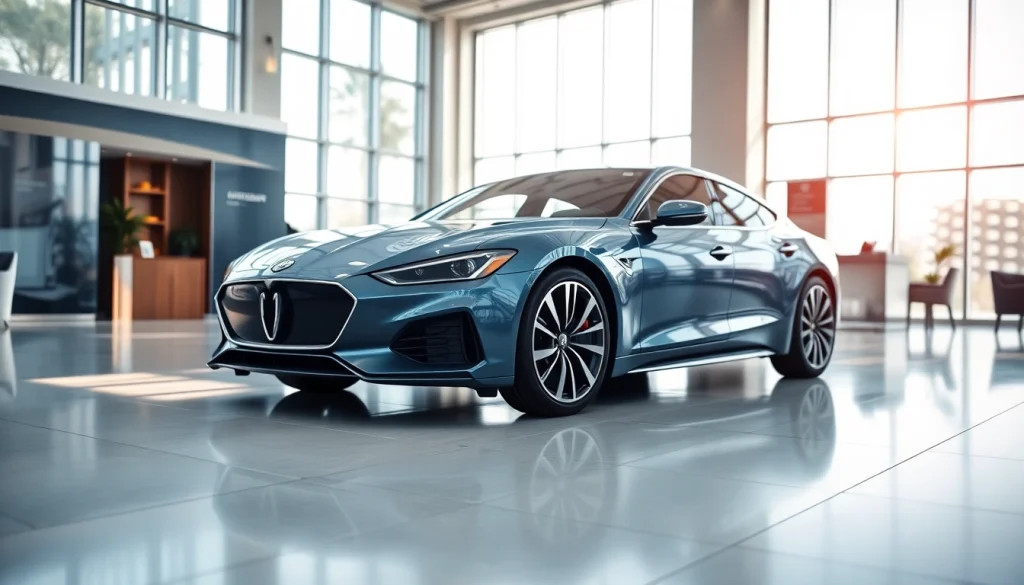Finding Your Perfect Car: A Comprehensive Guide to Selection and Ownership

Understanding What Makes the Perfect Car
When embarking on the journey to find your perfect car, it’s essential to understand what that term truly means. The notion of a “perfect car” differs from person to person, enveloping various factors such as personal preferences, needs, and long-term goals. The process starts with defining your requirements, and from there, you can explore the elements that coalesce to form your ideal vehicle.
Defining Your Needs and Priorities
The first step in your quest for the perfect car is identifying the specific needs that it must fulfill. Consider the following factors:
- Purpose: Is the car for daily commuting, family outings, weekend trips, or perhaps off-roading adventures?
- Passenger Capacity: How many people will typically be traveling with you? This can dictate whether you need a compact car, a sedan, or an SUV.
- Fuel Efficiency: With rising fuel prices, this is an increasingly crucial factor. Assess how many miles per gallon (MPG) your car needs to achieve based on your driving patterns.
- Climate Considerations: If you live in an area subject to harsh weather conditions, you may need a vehicle that can handle snow, ice, or heavy rain.
- Technology Features: Do you prioritize tech-integrated features like advanced safety systems, entertainment options, or connectivity capabilities?
Key Features to Look For in Your Perfect Car
Once you’ve established your basic needs, it’s time to identify the key features that will enhance your driving experience. These might include:
- Safety Ratings: Check the safety ratings from organizations like the National Highway Traffic Safety Administration (NHTSA) and the Insurance Institute for Highway Safety (IIHS).
- Comfort: Evaluate seating materials, climate control, and cargo space. After all, your perfect car should offer comfort for both the driver and passengers.
- Performance: Depending on personal preference, you may want powerful acceleration, a smooth driving experience, or a balance of both.
- Reliability: Research makes and models known for their durability and low maintenance costs.
- Resale Value: Consider how well the vehicle retains its value over time, which is particularly important for financial planning.
Your Budget: Balancing Cost and Quality
Budgeting is a crucial aspect of any car purchase. Here, you’ll need to balance the desire for a high-quality vehicle with the practicalities of what you can afford:
- Initial Cost: This includes the purchase price of the car. It’s worth noting that higher-cost vehicles might offer better amenities but also come with increased long-term expenses.
- Financing: Explore financing options if payment plans are a necessity, and always read the small print regarding interest rates.
- Ownership Costs: Factor in fuel costs, insurance rates, taxes, and maintenance expenses when evaluating the total cost of ownership.
- Potential Trade-in Value: Consider how much you may receive in return when it’s time to sell or trade-in your vehicle, which could offset your costs.
Researching the Market for Your Perfect Car
The next phase of the process involves thorough market research. This step is essential in ensuring that you find the available options that best match your defined needs.
Exploring Online Platforms and Resources
Today, numerous online platforms can assist in your car search. Utilize resources such as:
- Car Comparison Websites: Websites like Kelley Blue Book and Edmunds allow you to compare different models based on specs, features, and user reviews.
- Manufacturer Websites: Often, these sites provide detailed information about new models, specifications, and the latest technology in vehicles.
- Dealership Websites: Local dealerships might have special offers or promotions that can help you find your perfect car within your budget.
Leveraging Reviews and Customer Experiences
Don’t underestimate the value of customer testimonials and reviews. By understanding other users’ experiences, you can gain insights into:
- Common issues other owners have faced.
- Highlight features highly praised by customers.
- The overall satisfaction rate regarding specific models or brands.
Consulting Experts: Dealerships and Auto Brokers
While online research is invaluable, consultation with experts can provide perspective that can only come from experience:
- Dealerships: Consider visiting a few local dealerships to see the cars in person. This allows you to ask detailed questions and observe the vehicle firsthand.
- Auto Brokers: If navigating car buying feels overwhelming, hiring an auto broker may save you time and potential pitfalls. Brokers have industry connections and can often find deals not publicly advertised.
Test Driving: Evaluating Your Perfect Car
It’s critical to take a vehicle for a test drive before making any purchasing decision. This hands-on experience will leave you with greater confidence in your ultimate choice.
What to Look For During a Test Drive
During your test drive, pay attention to several key indicators of performance, comfort, and usability:
- Driving Comfort: Sit in both the driver’s seat and passenger seats to assess comfort levels.
- Visibility: Ensure that the cabin provides great visibility and the necessary mirrors and positioning assistance help you feel safe.
- Noise Levels: Take note of engine noise, road noise, and how quiet the car is overall.
- Safety Features: Test features such as brakes, acceleration, and this might also be a good time to check advanced safety features if present.
Understanding the Importance of Hands-On Experience
The importance of directly interacting with your potential car cannot be overstated. Test-driving different vehicles will allow you to assess features that might be difficult to judge from specifications alone, such as:
- How it handles under different road conditions.
- Its responsiveness to steering and acceleration.
- The overall feel of the drive, which can be subjective but crucial to your satisfaction.
Making an Informed Decision Post-Test Drive
After conducting test drives, take the time to compare your experiences. Create a list of pros and cons for each vehicle. This reflection period helps in making an informed decision, ensuring the choice aligns closely with your defined needs.
Financing Options for Your Perfect Car
Securing the financial aspect of your car purchase can seem daunting, but understanding the options available can help you make smart decisions.
Understanding Car Loans and Leases
When purchasing a car, you typically have two main financing options:
- Loans: A car loan involves borrowing money to buy the vehicle outright. This means once paid off, you own your car without further obligations.
- Leases: Leasing allows you to drive a car for a fixed term while making monthly payments, but you’re required to return the vehicle at the lease’s end. This option can work well for those who enjoy driving new models regularly.
Negotiating Prices and Exploring Deals
After understanding your financing options, be prepared to negotiate. Here are some tips:
- Research the average market price for your chosen model to establish a bargaining baseline.
- Don’t settle for the first offer—dealerships often have flexibility on pricing.
- Consider timing your purchase around yearly sales events when dealerships aim to clear inventory, which can lead to better deals.
Insurance Considerations for Your Perfect Car
Be sure to also consider insurance costs associated with the vehicle. Factors influencing insurance rates include:
- The car’s make and model.
- Your driving history.
- Your location.
It’s recommended to shop around and get quotes from several insurance providers to ensure you secure the best coverage at a reasonable cost.
Taking Care of Your Perfect Car
After successfully purchasing your vehicle, the next crucial phase is proper care and maintenance, which will extend the life and performance of your perfect car.
Essential Maintenance Tips for Longevity
To maintain your car’s operational efficiency, commit to a regular maintenance schedule that includes:
- Oil changes at manufacturer-recommended intervals.
- Regular tire rotations and checks for proper inflation.
- Keeping the battery terminals clean to avoid corrosion.
- Checking and replacing brake pads as needed.
Upgrades and Enhancements for a Personalized Experience
To enhance your driving experience, consider customizing your vehicle to better suit your taste and lifestyle. This can include:
- Installing modern infotainment systems for enhanced connectivity.
- Upgrading wheels and tires for performance improvement.
- Personalizing your car’s interior with custom seat covers, floor mats, and steering wheel covers to reflect your style.
Resources for Car Troubleshooting and Assistance
Even the best cars can encounter problems. Know where to turn for troubleshooting and help:
- Owner’s Manuals: Always keep your car’s owner manual handy for reference on issues and repairs.
- Online Forums: Websites and communities exist where owners share experiences, troubleshooting tips, and advice.
- Professional Mechanics: Building a relationship with a trusted local mechanic can provide reliable advice and service when issues arise.






